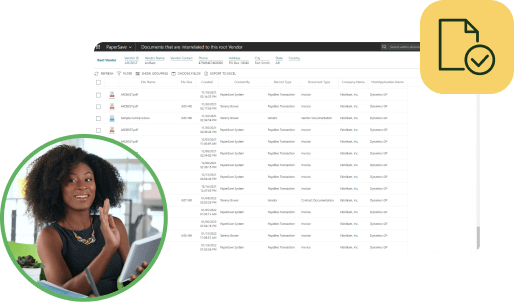
Wadih Pazos
Wadih founded both PairSoft and PaperSave. He is an avid technologist who specializes in streamlining operations and maximizing productivity.
View all posts by Wadih PazosWadih Pazos

To an accountant, there’s probably nothing more frustrating then attempting to find a single employee tax form among a stack of paper nearly a foot high. Is it possible that the client took the time to neatly organize all statements in chronological order? Just because an event is plausible, doesn’t mean it’s going to happen. Not to mention, it’s not as if the bookkeeper has one person to file tax returns for. Depending on the size of their business, accountants could have dozens, if not hundreds, of people relying on them to manage their finances.
So where’s the solution? Brock Philp, CEO of a document management software vendor and contributor to AccountingWeb, claimed that accessing necessary files and records through electronic means proves to be much more efficient than spending hours perusing through filing cabinets or desk drawers. Even the most assiduous bookkeepers are bound to misplace an item that may hold vital client monetary information, but paperless systems provide users with easy-to-use search and manage features that make it simple to obtain necessary items. Everything from spreadsheets to legal forms can be submitted and organized in the program.
If one were to look at the average price for a ream of basic printer paper, they’re probably not going to cringe. Multiply that by 200 and he or she may reconsider utilizing tangible records. Thankfully, paperless document management allows users to significantly reduce expenses associated with paper-heavy workflow. According to Digital Journal, Carolina Accounting and Tax Service, an accounting firm located in Charlotte, N.C., recently announced that it reduced 75 percent of its paper and ink toner usage in anticipation of Earth Day.
“To make going paperless a reality, we had to identify and invest in systems and technology that allowed us to accomplish our goal of waste reduction while improving efficiency, communication and delivering value-added innovative solutions to our clients,” said Richard Beauchemin, a certified public accountant with Carolina Accounting and Tax, as quoted by the news source.
In order for the document management workflow to operate practically, Beauchemin noted that the organization provided its clients with access to the firm’s public cloud server, allowing customers to submit files through their personal electronic storage cabinets. In the event they need to view their information, the company’s customers can attain it from anywhere, anytime through a secure connection. Digital bulwarks and other protective measures were added to ensure the confidentiality of client records.
For accountants across the nation, the option of eliminating that foot-high stack of papers is a possibility. There’s no reason why bookkeepers should make themselves suffer: Crunching numbers five days a week or more is hard enough.
Automated workflows empower your team to focus on larger, more complex initiatives without having to think about small processes.


Many organizations start with manual receipt handling, fragmented card feeds and slow AP processes. Implement AI agents to auto-capture receipts, route approvals, enable punch-out buys and post to the ERP.
Result: faster batching, fewer errors and cost savings. “This saves us hours every month.”
Many organizations face slow, paper-heavy AP and fragmented procurement that waste time and inflate costs. AI Agents can automate approvals, PO matching and record sync to improve speed, accuracy and control. Client quote: “It freed up hours and made our process reliable.”
Operational drag and rising costs slow growth: teams waste time on manual tasks, misaligned priorities and opaque processes. AI Agents help automate routine work and coordinate actions across teams. “We’ve lost time to repeats and handoffs,” says a typical client.
Companies struggle with manual procurement, fragmented approvals, and costly integrations that slow growth and obscure spend. Our AI Agents streamline requisitions, POs, and invoice matching to cut manual work and improve visibility. “We were wasting time and missing insights,” says a client.

Many teams start with fragmented PO/AP systems, manual matching and delayed financial reporting. Deploying AI agents to automate PO checks, real-time encumbrance tracking and invoice matching reduces processing time and errors, delivering live budgets and faster closes. “Finally, we can see current balances and approve instantly.”
Many companies juggle growing invoice volumes and legacy systems. They struggle with manual processes, compliance gaps and limited headcount. Our AI Agents automate integrations, enforce rules and surface exceptions. The typical outcome: faster closes and measurable ROI. “We stopped chasing invoices.”